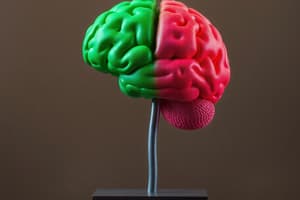Podcast
Questions and Answers
Wat is het belangrijkste aspect van het besluitvormingsproces?
Wat is het belangrijkste aspect van het besluitvormingsproces?
- Het identificeren van een probleem
- Het verzamelen van informatie
- Het kiezen van de beste optie (correct)
- Het beoordelen van alternatieven
Waarom kan het maken van keuzes uitdagend zijn binnen besluitvorming?
Waarom kan het maken van keuzes uitdagend zijn binnen besluitvorming?
- Omdat er vaak slechts één juiste optie is
- Omdat de informatie altijd beperkt is
- Omdat het balanceren van meerdere factoren en mogelijke uitkomsten betrokken kan zijn (correct)
- Omdat de meeste alternatieven onduidelijk zijn
Waarom is het vergaren van relevante informatie zo cruciaal voor succesvolle besluitvorming?
Waarom is het vergaren van relevante informatie zo cruciaal voor succesvolle besluitvorming?
- Het maakt een snellere besluitvorming mogelijk
- Het zorgt voor een beter begrip van de beschikbare opties (correct)
- Het geeft geen significant voordeel bij het nemen van beslissingen
- Het vermindert de stress die gepaard gaat met beslissingen
Wat is een kritische strategie om de besluitvorming te verbeteren?
Wat is een kritische strategie om de besluitvorming te verbeteren?
Hoe kunnen langdurige gevolgen helpen bij het maken van keuzes?
Hoe kunnen langdurige gevolgen helpen bij het maken van keuzes?
Waarom is het definiëren van de aard van een beslissing essentieel in het proces?
Waarom is het definiëren van de aard van een beslissing essentieel in het proces?
Wat is een kritieke stap in het nemen van een goed besluit volgens de tekst?
Wat is een kritieke stap in het nemen van een goed besluit volgens de tekst?
Welke populaire mentale fout wordt genoemd in de tekst die mensen kunnen beïnvloeden bij besluitvorming?
Welke populaire mentale fout wordt genoemd in de tekst die mensen kunnen beïnvloeden bij besluitvorming?
Wat is een essentiële manier om betere beslissingen te nemen in onzekere tijden volgens de tekst?
Wat is een essentiële manier om betere beslissingen te nemen in onzekere tijden volgens de tekst?
Welke auteur wordt genoemd als auteur van 'Thinking, Fast and Slow' in de tekst?
Welke auteur wordt genoemd als auteur van 'Thinking, Fast and Slow' in de tekst?
Wat is een belangrijke reden waarom mensen vaak onjuiste beslissingen nemen, volgens de tekst?
Wat is een belangrijke reden waarom mensen vaak onjuiste beslissingen nemen, volgens de tekst?
Hoe kunnen mentale modellen helpen bij het verbeteren van besluitvormingsvaardigheden volgens de tekst?
Hoe kunnen mentale modellen helpen bij het verbeteren van besluitvormingsvaardigheden volgens de tekst?
Flashcards are hidden until you start studying
Study Notes
Decision Making: The Art of Choosing Wisely
Have you ever found yourself struggling to make a choice between two equally appealing options? Or perhaps you've hesitated to make a decision because of the fear of making the wrong one? Decision making is a critical skill that can impact various aspects of our lives, from personal to professional matters. In this article, we'll explore the process of decision making, the importance of making informed choices, and strategies to improve your decision-making abilities.
Defining Decision Making
Decision making is the process of identifying a problem, gathering information, assessing alternatives, and choosing the best option based on the available information. It involves making choices that can often be challenging, as they may involve balancing multiple factors and potential outcomes.
The Importance of Informed Choices
Making informed choices is crucial for successful decision making. This involves gathering relevant information, assessing the potential risks and benefits of each option, and considering the long-term consequences of your decisions. By doing so, you can increase your chances of making a wise and beneficial choice.
Strategies for Improved Decision Making
-
Identify the decision: Clearly define the nature of the decision you need to make, as this is the first step in the decision-making process.
-
Gather information: Collect all relevant information, both internal and external, to make an informed choice. This may involve self-assessment, research, and consultation with others.
-
Assess alternatives: Identify multiple options and evaluate their potential outcomes, risks, and benefits. This step allows you to compare alternatives and choose the most suitable one.
-
Weigh the evidence: Consider the information gathered and imagine the potential outcomes of each option. This step helps you evaluate the alternatives and make a well-informed choice.
-
Choose the best alternative: Once you have weighed the evidence, select the option that aligns best with your goals and values. This choice may be the same or a combination of the alternatives.
-
Take action: Implement the chosen alternative and monitor its outcomes.
-
Review the decision: Review the results of your decision and assess whether it has resolved the identified need. If not, you may need to make adjustments or repeat the decision-making process.
Mental Models for Smart Decision Making
Mental models are frameworks or theories that help explain why the world works the way it does. By learning and applying mental models, you can improve your decision-making skills and make wiser choices. Some popular mental models include Margin of Safety, Inversion Technique, and Thinking for Yourself.
Overcoming Common Mental Errors
Humans tend to make decisions based on mental shortcuts, which can lead to errors. Understanding these errors, such as survivorship bias, loss aversion, availability heuristic, anchoring, and confirmation bias, can help you make more informed and rational decisions.
Best Decision Making Books
There are several books that can help you improve your decision-making skills. Some of the best ones include "Thinking, Fast and Slow" by Daniel Kahneman, "Poor Charlie's Almanack" by Charles T. Munger, "Seeking Wisdom" by Peter Bevelin, and "Decisive" by Chip Heath and Dan Heath.
Decision Making in Uncertain Times
Making decisions in uncertain times can be challenging. However, by following a structured decision-making process, seeking diverse perspectives, and embracing a growth mindset, you can navigate these situations more effectively.
Conclusion
Decision making is a skill that can be improved with practice and the right tools. By understanding the decision-making process, gathering relevant information, assessing alternatives, and choosing the best option based on the available information, you can make wiser choices and achieve better outcomes in various aspects of your life. Remember, the key is to avoid overthinking, make small decisions often, and weigh the evidence before making a choice.
Studying That Suits You
Use AI to generate personalized quizzes and flashcards to suit your learning preferences.





